Bicester Leisure Centre
The solar carport installation for Cherwell District Council and Bicester Leisure Centre is one of the UK’s largest local authority-owned solar carports in the UK.
Saving more than
of carbon emissions per year
With more than 20,000 clean energy systems installed nationwide, Solarsense is the UK’s leading consulting, design and installation company for solar and storage.

Solarsense are the perfect EPC partner for your renewable energy projects and tenders. We have worked with an extensive range of public sector organisations from councils and local authorities to leisure centres and healthcare organisations.
Whatever your goal – we will help you reach it – whether it is reducing CO2 emissions to meet carbon reduction targets, implementing cost saving reductions or simply improving your ESG credentials – we understand the need to manage budgets effectively and have a strong track record of delivering award-winning clean energy projects on time, within budget and with minimum disruption. For more information, please see our Public Sector Guide to Solar and Battery Storage.
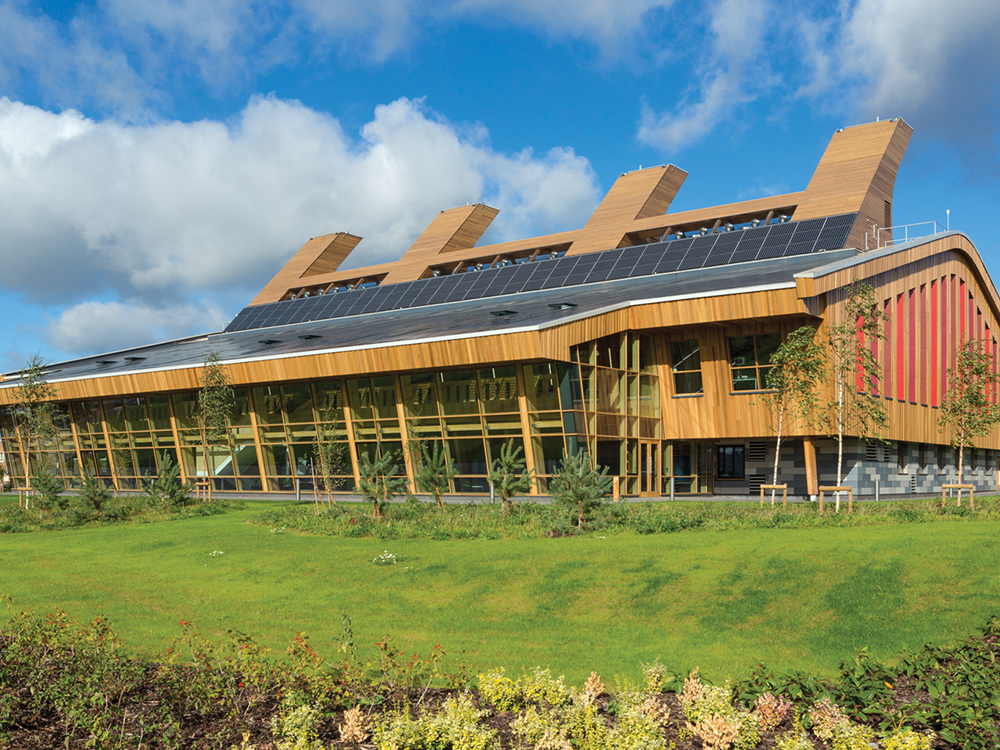
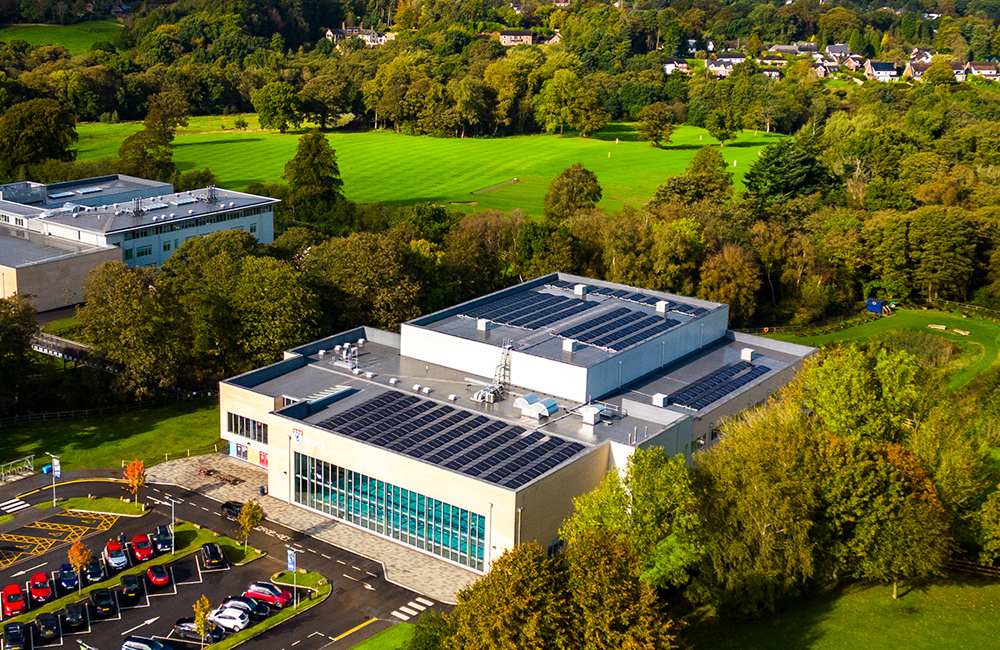
Public sector organisations in the UK, including councils, local authorities, schools, healthcare facilities, leisure centres and other government entities, are increasingly prioritising sustainability to reduce their operating costs, whilst simultaneously improving their carbon footprint.
Renewable energy technologies such as solar PV panels, solar carports and battery storage offer innovative solutions for reducing energy costs, creating financial stability and contributing to the UK’s net-zero emissions target. As the UK accelerates its transition toward renewable energy, the adoption of these technologies across public sector buildings, from emergency services to hospitals, will play a critical role in meeting climate goals while delivering long-term economic benefits.
Solar PV panels work by converting sunlight into clean electricity to power your premises and facilities, effectively turning your unused land or roof space into an asset. Solar panels come in a variety of shapes and sizes and can be installed in a range of locations, making them one of the most versatile renewable energy sources available.
Mounting commercial solar panels on the roof of your building is the most cost-effective method of installing solar PV and the most common installation type for public sector buildings. Solar PV panels can be fixed to almost any roof type, pitch and orientation, including flat roofs and roofs containing asbestos. Ground mounted PV systems are also gaining popularity with public sector organisations that have unused land, have already filled their roof space or have issues with sky lights or vents.
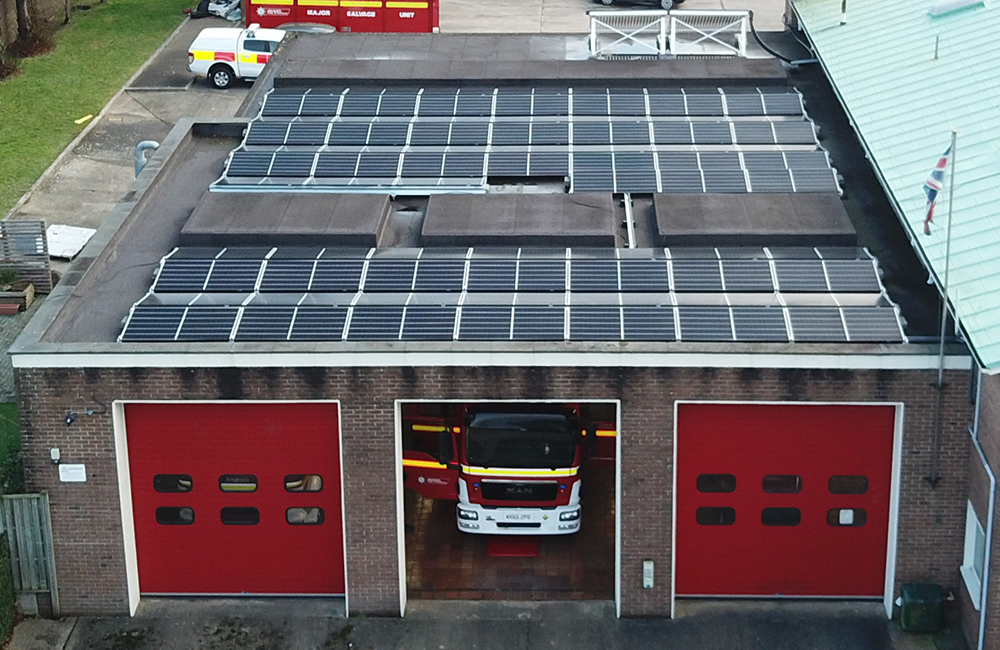
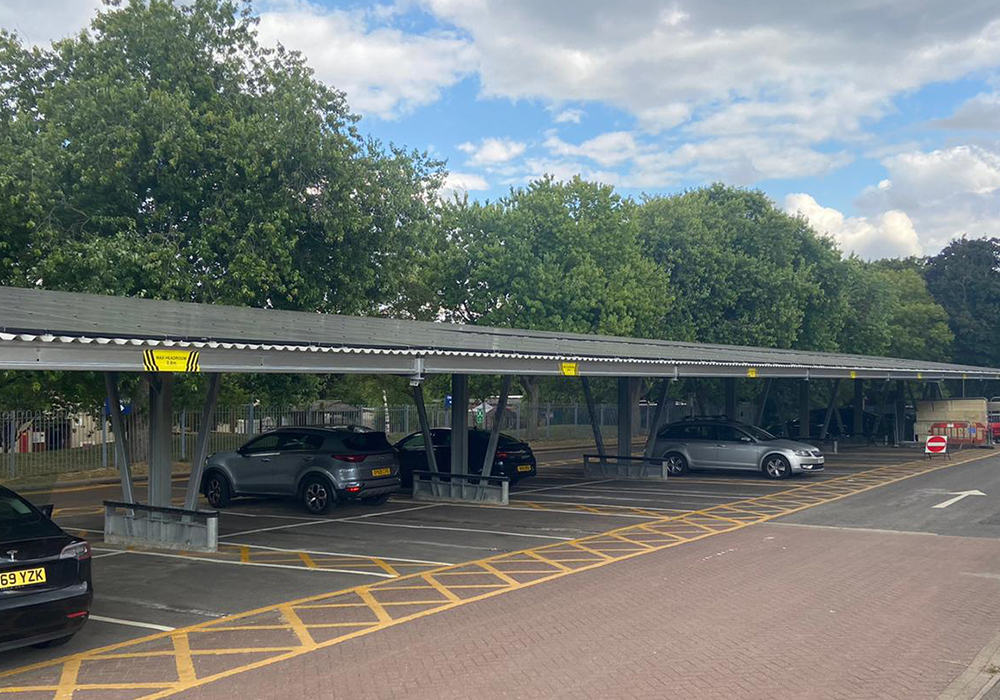
A solar carport is a multi-purpose, stand-alone steel structure that provides shelter for vehicles, whilst generating clean energy from the sun. This electricity can then either be used on-site and (or) used to charge a fleet of electric vehicles. Solar carports are rapidly gaining popularity with organisations that have already filled their roofs with solar PV and want to visibly promote their dedication to sustainability. They can be customised and equipped with gutters to harvest rainwater and have branding applied. Solar carports can increase land value and create revenue opportunities for site operators from EV charge-points and advertising opportunities.
Cherwell District Council commissioned one of the UK’s largest local authority-owned solar carports as part of its efforts to reduce its carbon footprint. The installation covers around 60 parking spaces and is expected to generate more than 150,000kWh of clean electricity per year — about 18% of the total energy demand of the leisure centre.
Integrating your solar panels with a commercial battery storage solution allows you to increase the efficiency of your solar PV system and maximise the potential benefits. This is because you gain greater control over your energy consumption and can store excess solar energy to be used when you need it most, or when it is most cost effective. Even without solar energy generation, public sector organisations may choose to charge up a battery at a time when energy prices are low (e.g. at night) for use during peak times (e.g. 4pm – 7pm).
Battery storage can enable businesses to supply extra power (above their DNO connection capacity), or provide back-up power for emergencies. Effective battery storage for solar will become increasingly critical with the introduction of mandatory half-hour metering from April 2025.
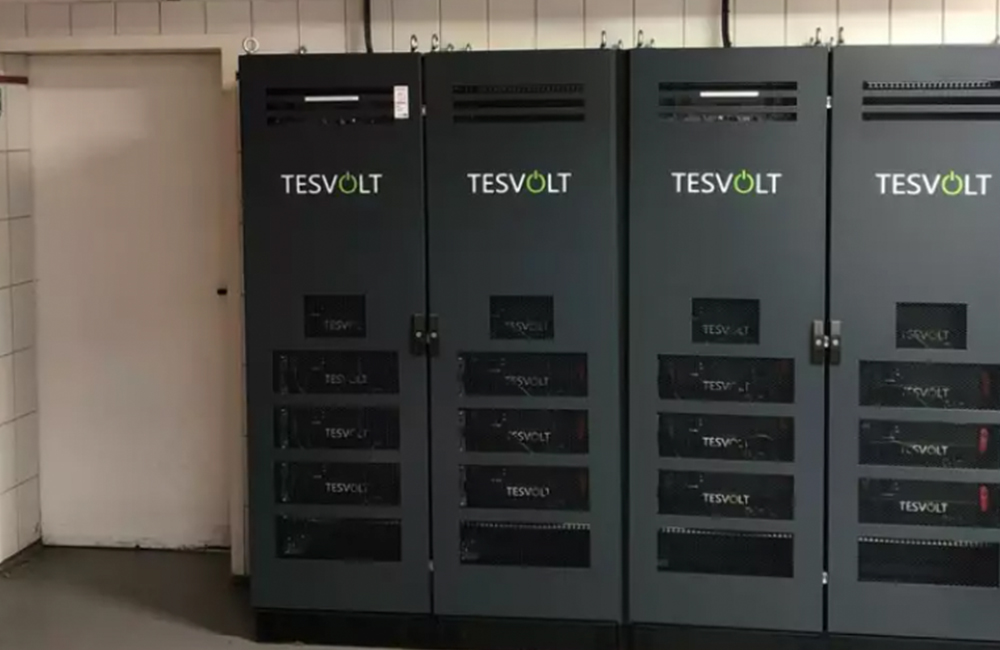
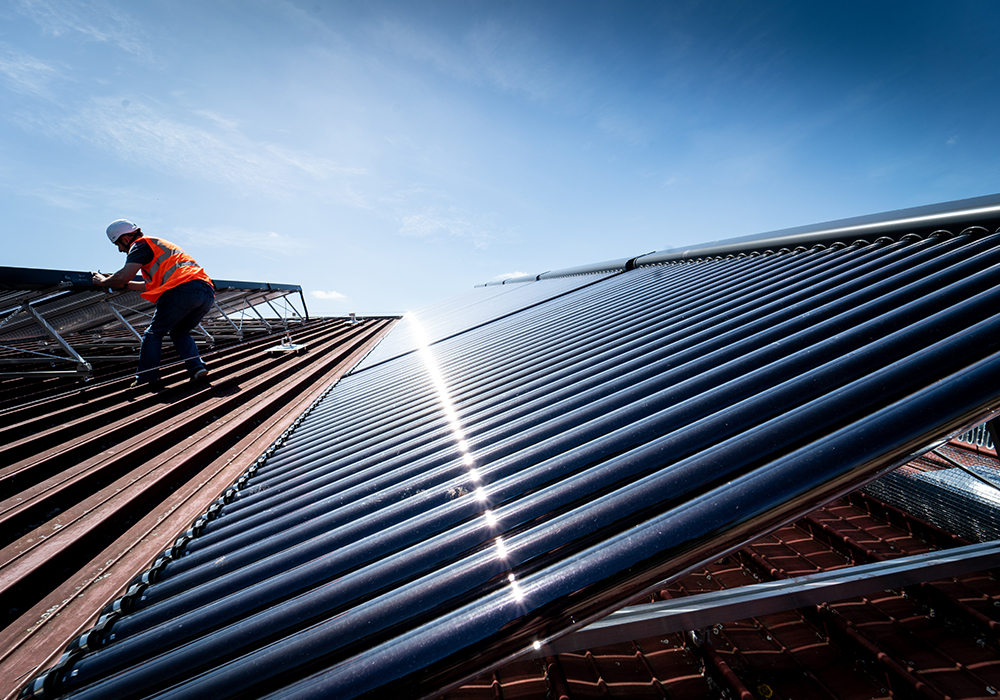
A solar thermal or solar hot water system consists of solar collectors (evacuated tubes or flat plates), a pump, and a twin coil hot water cylinder which acts as a thermal store. As daylight heats the fluid, the energy is transferred to a heat exchanger, which then heats the water in a storage tank. This hot water can be used for various purposes, such as heating swimming pools, showers, or even space heating. The system is highly efficient and uses renewable energy, reducing reliance on fossil fuels.
The Easton Leisure Centre solar thermal project was commissioned by Bristol City Council and Everyone Active to reduce to reduce the leisure centre’s carbon footprint. Within six weeks of the solar thermal technology being installed, Easton Leisure Centre reported that its swimming pool’s heating bill was reduced to zero.
There are a wide-range of options to help with the funding and deployment of clean energy projects in the UK. Some of the solar and storage financing schemes are outlined below, for more information please see clean energy finance.
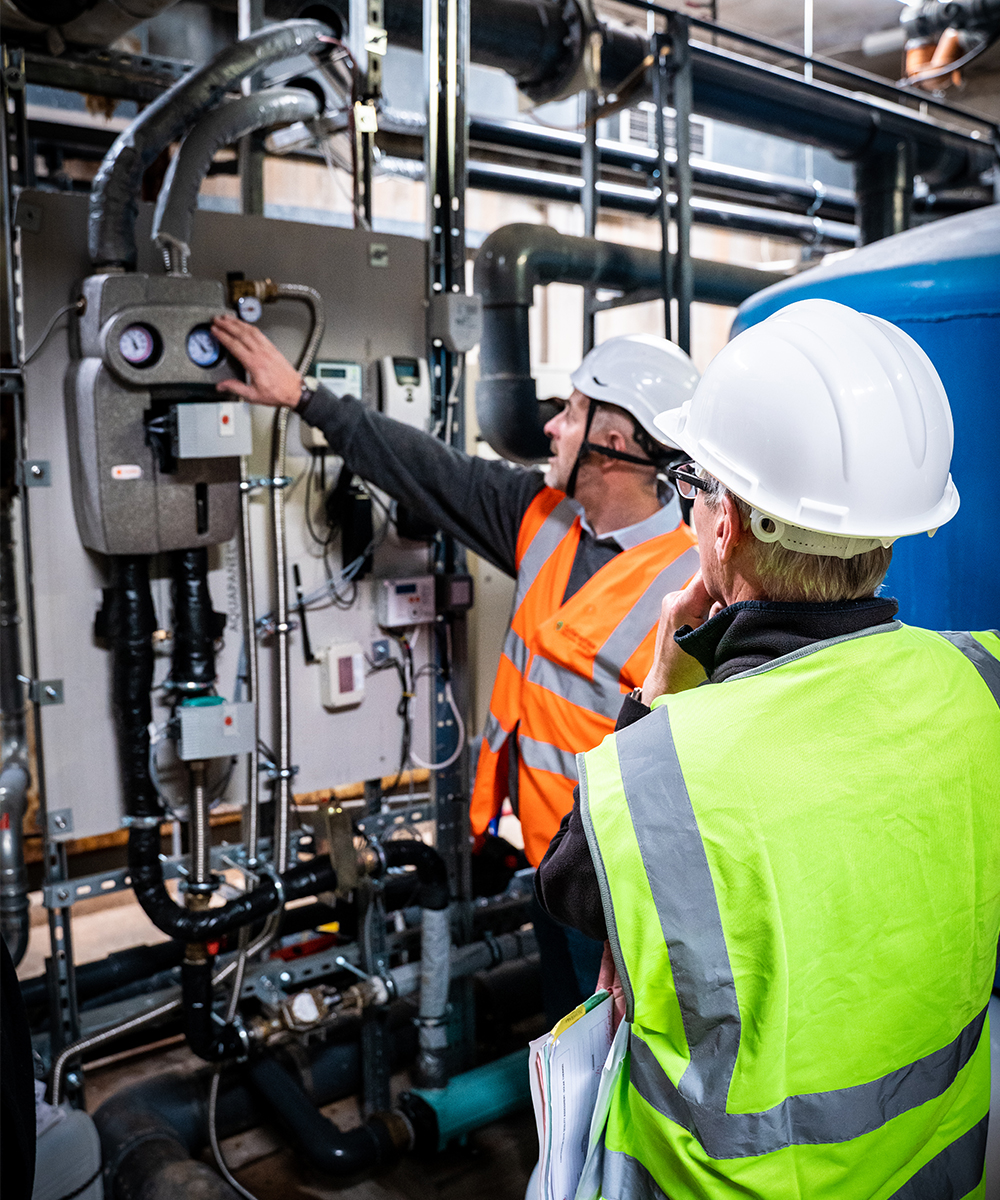
Greater Energy Security and Resilience: Solar power and energy storage enhances energy security, reducing dependence on the grid and safeguarding against outages — especially important for maintaining life-saving equipment in hospitals and critical services provided or overseen by local authorities.
Cost Savings and Financial Security: Solar energy can help public sector organisations offset their energy costs. You can effectively forward-buy your electricity at around 5p per unit – a figure that includes estimated operations and maintenance costs.
Future-Proofing Facilities: Solar installations can ensure public buildings are fit for the future from a sustainability standpoint, particularly when the bulk of the Private Finance Initiatives (PFIs) begin to expire from 2025.
Carbon Footprint Reduction: Investing in solar energy helps reduce the carbon footprint of the public sector, supporting the NHS, local authorities, and other public bodies in achieving their climate and sustainability goals.
Climate Action Stewardship: The public sector has an opportunity to demonstrate climate leadership in their respective communities, practicing what they’re preaching in terms of net zero targets, by investing in renewable energy solutions, including solar.
Solar for Schools Programme
Solarsense worked closely with Bristol City Council to help deliver what was at the time, the largest solar for schools programme in the UK. In total 35 schools throughout Bristol received a solar PV installation, combining to produce 550kWp. The combined installations are predicted to save the local authority more than £60,000 per year.
Each project differed in size depending on the available roof space and orientation. Solarsense worked collaboratively with all the schools to identify the most disruptive elements of the works and put in place a schedule which minimised impact on the school working day. The installations were completed quickly and with little or no impact on the children’s learning.
Due to the number of individual parties involved with the installations, Solarsense developed a unique ‘Illustrated Method Statement’ which would demonstrate exactly what the installation would entail. This could then be made available to personnel at the school, its teachers, boards and governors, shared within the council and used as precise instruction to engineers and installers. As part of the scheme, Solarsense included a data logger and weather station on each installation, so that the schools could collect and monitor the solar data as part of their curriculum.
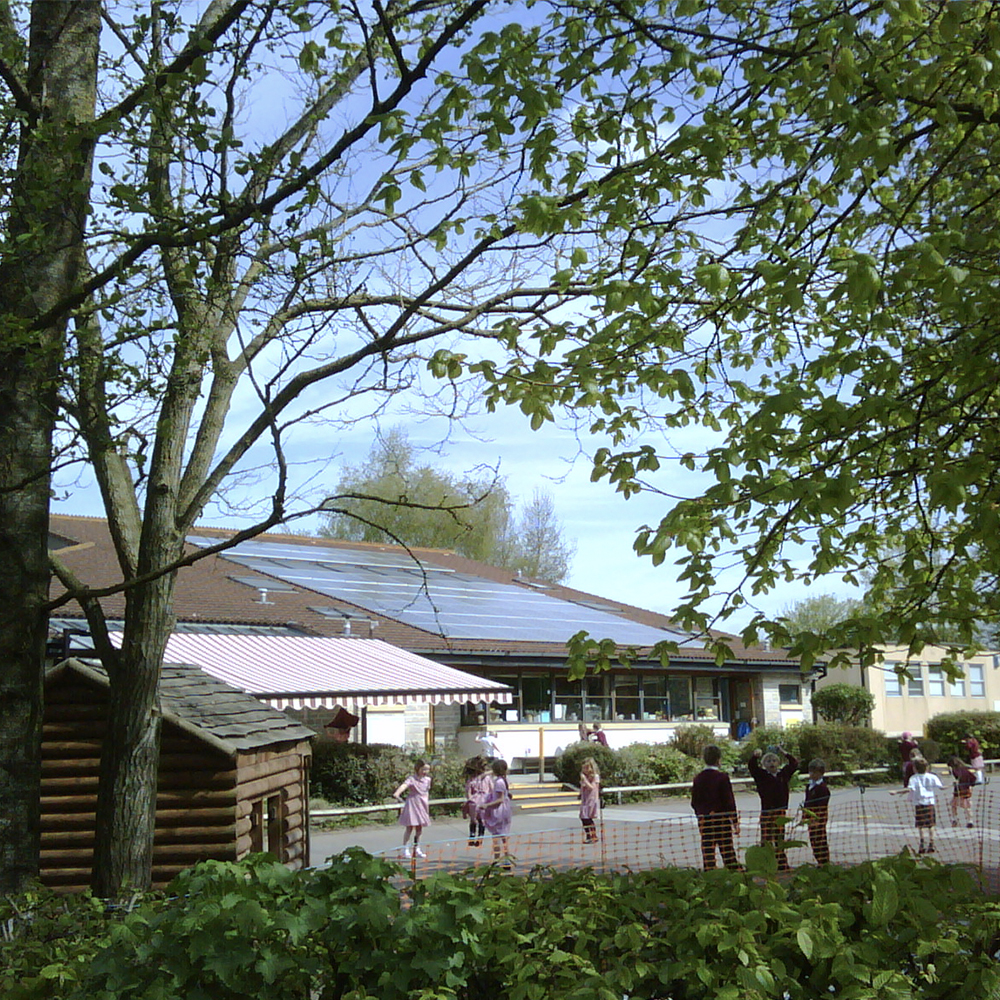
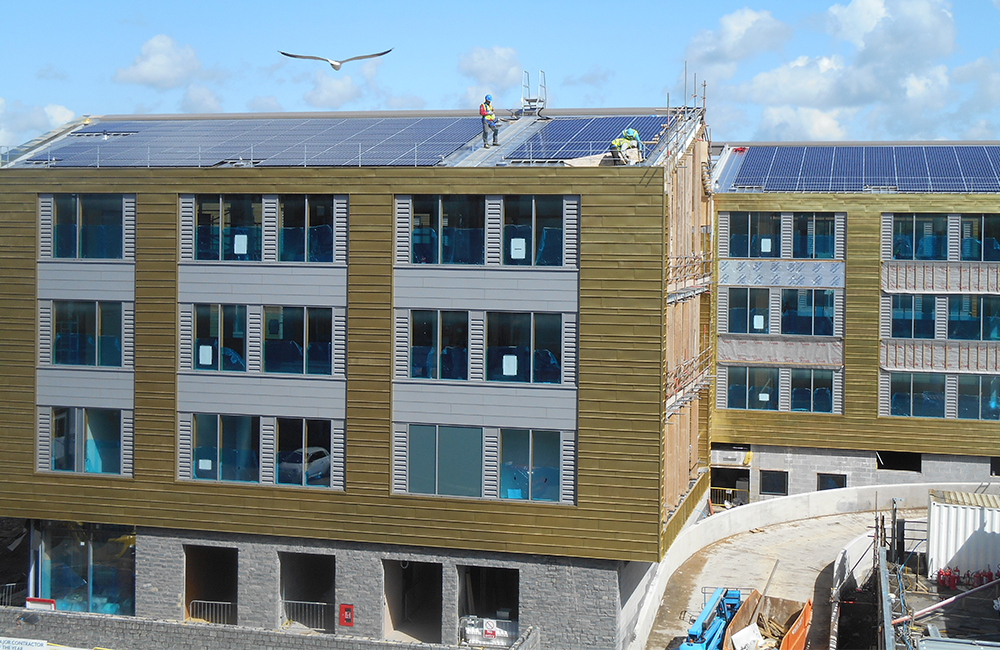
Established in 1995, Solarsense has completed more than 20,000 renewable energy installations and is responsible for powering some of the UK’s leading organisations. We have worked with a wide range of public sector clients throughout the UK including; Portsmouth and Wiltshire Council, Avon Fire & Rescue Service, South Bristol Community Hospital and South Gloucestershire and Stroud College.
We are fully accredited solar panel experts who hold an excellent health and safety record. By choosing to work with Solarsense, you can be assured of realistic assessments, honest financial projections and transparent project management from our expert team. We take the time to understand your project and ensure that the clean energy system we provide will deliver what we have projected to meet your specific needs.
We have installed 20,000 clean energy systems across all types of roof as well as ground mounted PV systems and solar carports.
We work with our clients and audit your current situation to identify the best suited technologies for your specific needs.
We work with our clients every step of the way, including; planning permissions, DNO, G59, and grant applications.
Our energy experts are on hand to consult and guide you from start to finish, helping you to achieve your desired outcome.
We pride ourselves on building long lasting relationships - proven by our high rate of repeat custom and impressive customer feedback.
Each year we invest our time and expertise in direct support of selected charitable projects throughout the UK and beyond.